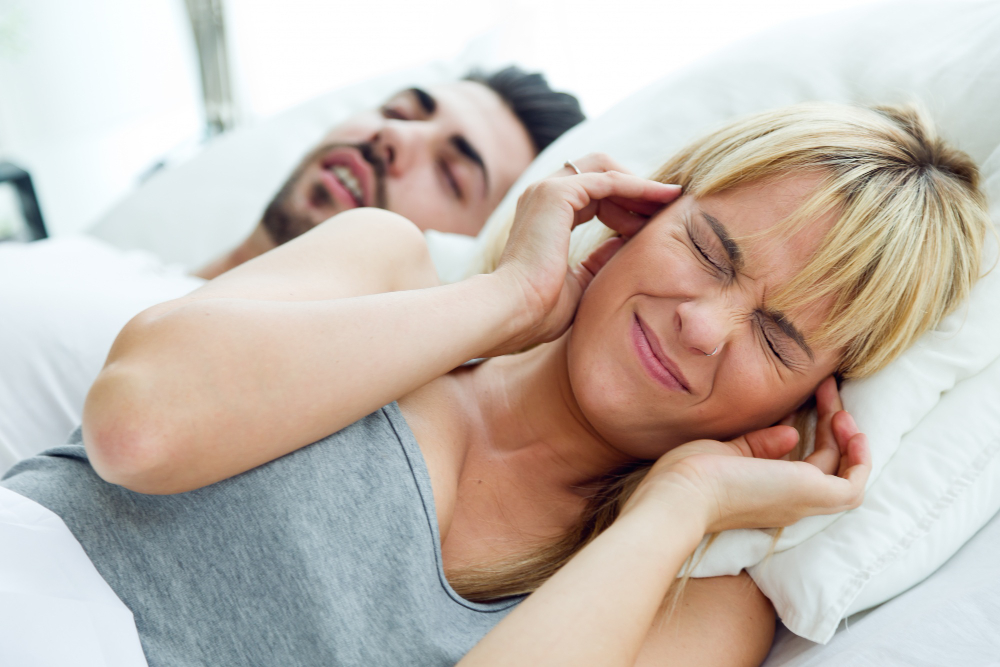
April 4, 2025, By Virginia TMJ Facial Pain and Sleep Center
Do you snore loudly, wake up feeling groggy, or find yourself nodding off during the day—even after a full night’s sleep? You might be brushing off these red flags as everyday tiredness, but they could be symptoms of sleep apnea, a serious sleep disorder that often goes undiagnosed.
In this blog, we’ll break down exactly how to recognize the signs of sleep apnea, what to look out for, and how to take the next steps toward diagnosis and treatment.
What Is Sleep Apnea?
Sleep apnea is a condition where your breathing repeatedly stops and starts during sleep. This interruption in airflow can happen dozens or even hundreds of times a night, severely disrupting your rest and overall health.
There are three main types of sleep apnea:
- Obstructive Sleep Apnea (OSA): The most common form, caused by a blockage in the airway.
- Central Sleep Apnea (CSA): When your brain doesn’t send the right signals to control breathing.
- Complex Sleep Apnea: A combination of both OSA and CSA.
The prompt sleep apnea treatment in Glen Allen will restore restful sleep, improve daytime alertness, and reduce the risk of serious health complications.
Key Warning Signs You Shouldn’t Ignore
Sleep apnea often flies under the radar because many of its symptoms occur while you’re asleep. However, there are daytime and nighttime clues you can watch for:
Nighttime Symptoms:
- Loud, chronic snoring.
- Gasping or choking during sleep.
- Pauses in breathing (often noticed by a partner).
- Restless tossing and turning.
Daytime Symptoms:
- Morning headaches.
- Dry mouth or sore throat upon waking.
- Excessive daytime sleepiness.
- Difficulty concentrating or forgetfulness.
- Irritability or mood swings.
An estimated 22 million Americans suffer from sleep apnea, and 80% of moderate to severe cases remain undiagnosed, according to the American Lung Association.
That means millions of people are unknowingly putting their health at risk every single night.
At-Home Screening Tools: A Starting Point
If you suspect sleep apnea, you can begin by using simple self-assessments or apps. While they won’t confirm a diagnosis, they can provide useful clues.
Try asking yourself:
- Do I wake up feeling unrefreshed even after 7–8 hours of sleep?
- Has anyone told me I stop breathing during sleep?
- Am I frequently tired or drowsy during the day?
Use sleep-tracking apps to monitor snoring, breathing patterns, and interruptions. Keep a journal of your sleep habits and how you feel in the morning.
Ways To Detect
To confirm sleep apnea, you’ll need a sleep study—either at a clinic (polysomnography) or with an at-home sleep test. These tests monitor:
- Breathing patterns.
- Oxygen levels.
- Heart rate.
- Sleep stages.
Based on the results, a healthcare provider can determine the severity of your sleep apnea and recommend appropriate treatment options, such as CPAP machines, oral appliances, or lifestyle changes.
When To See a Doctor?
If you’ve checked off multiple symptoms or your sleep tracker reveals irregularities, it’s time to consult a doctor or sleep specialist.
Make the call if:
- You feel exhausted daily, even after full nights of sleep.
- Your snoring is disruptive or unusual.
- You experience frequent morning headaches or choking at night.
- You notice mood changes or trouble focusing.
Early intervention can dramatically improve your quality of life—and may even save it.
Sleep apnea is more than just snoring—it’s a serious condition that can lead to heart disease, high blood pressure, and other long-term complications if left untreated. Recognizing the signs is the first step toward reclaiming restful sleep and better health.
So if you’re wondering how to determine if you have sleep apnea, start by listening to your body—and your bed partner! The sooner you take action, the sooner you can breathe easier and sleep better.
